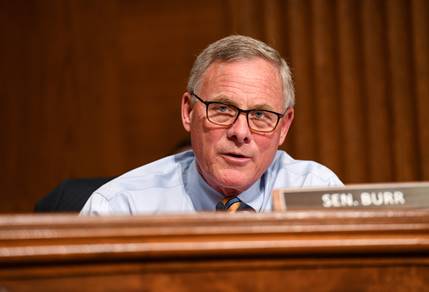Burr: Workforce Development Should Continue to Be Space for Bipartisan Solutions
Senate HELP Committee examines strengthening educational opportunities and job training programs amid pandemic recovery
Today, the Senate Health, Education, Labor and Pensions (HELP) Committee held a hearing entitled, “COVID-19 Recovery: Supporting Workers and Modernizing the Workforce Through Quality Education, Training, and Employment Opportunities.” This is the first hearing the Committee has held on workforce development amid the coronavirus pandemic in the 117th Congress.
In his prepared opening remarks, Senate HELP Committee Ranking Member Richard Burr (R-NC) highlighted the opportunity for bipartisanship by enhancing specialized job training programs and harnessing innovation to build a strong American workforce that keeps pace with the demands of the 21st century global economy.

WATCH: Ranking Member Burr delivers opening remarks before the Committee’s hearing on American workforce development
Excerpts:
“I’m glad that we are working together in a bipartisan effort to modernize our workforce programs and I hope that Democrat leadership will stop their threats to use a partisan reconciliation bill and commit to listening to Republican ideas and working together, as we are doing in this Committee.
“If we want to return to a booming economy, we need a plan to get there. As part of that plan, we need to make sure we have better systems in place that are equipped to connect job-seekers, employers, and education opportunities...
“As we begin these discussions on how best to help American workers get the skills they need, we have to look at what we have already done and what new ideas we need to include.
“We can start with the Workforce Innovation and Opportunity Act. This is our country’s primary law focused on workforce development, and it’s due to be reauthorized. We need to take this opportunity to see how this important law can be updated to meet the needs of workers and employers…
“We need to be innovative. More bureaucracy and paperwork is not the answer. We have to look at the system as a whole and make sure it is equipped to meet the demands of 2021 and beyond…
“If we want these programs to prepare people for good jobs, employers need to have a seat at the table. If training programs do not teach anyone the skills employers are actually looking for then we haven’t really helped anyone.
“We need to make sure that this law fosters strong collaboration between the public and private sector...
“Last year, state and local workforce boards had to respond to the pandemic and quickly adapt to a world where virtual services are the norm. These systems should be able to rapidly respond to meet the needs of their community, and we need to make sure that the law supports this responsiveness.
…
“The apprenticeship model is a great way for individuals to earn a wage while learning an in-demand skill. Unfortunately many employers are unable to access the federal system because of red tape and rules that favor labor unions.
“We saw a glimpse of the type of innovation we need through the Department of Labor’s rule on Industry Recognized Apprenticeship Programs that was issued by the previous Administration. This policy can expand the apprenticeship model to include more industries and provide new opportunities for training.
“To build on this idea, a bipartisan apprenticeship bill will need to find a way to support both traditional registered apprenticeship programs and programs that are developed and recognized by industry.
“I understand that there are important conversations to be had about accountability and quality for industry recognized apprenticeship programs, and we welcome that.
“We need all the tools in our toolbox to get people back to work – an ‘all of the above’ approach. But that does not mean we need to create a variety of new programs.
“The federal government already funds dozens of training programs across multiple federal agencies. We need to take a look at how we can improve and better align these programs, not just add a new layer of programs and mandates, so that state and local leaders, employers, and job seekers can reap the maximum benefits.
“Workforce development has been and should continue to be a space for bipartisan solutions.
…
“This is just the beginning of the conversation. We all have a big task ahead of us.
“I look forward to working with our witnesses, Chair Murray, and our colleagues to get our workforce programs up to speed and our country back to work.”
To read Ranking Member Burr’s full prepared opening statement, click here.